英语九年级 鲁教版(五四制)Unit 7 Life is full of the unexpected Section A课件(47张)
文档属性
| 名称 | 英语九年级 鲁教版(五四制)Unit 7 Life is full of the unexpected Section A课件(47张) | 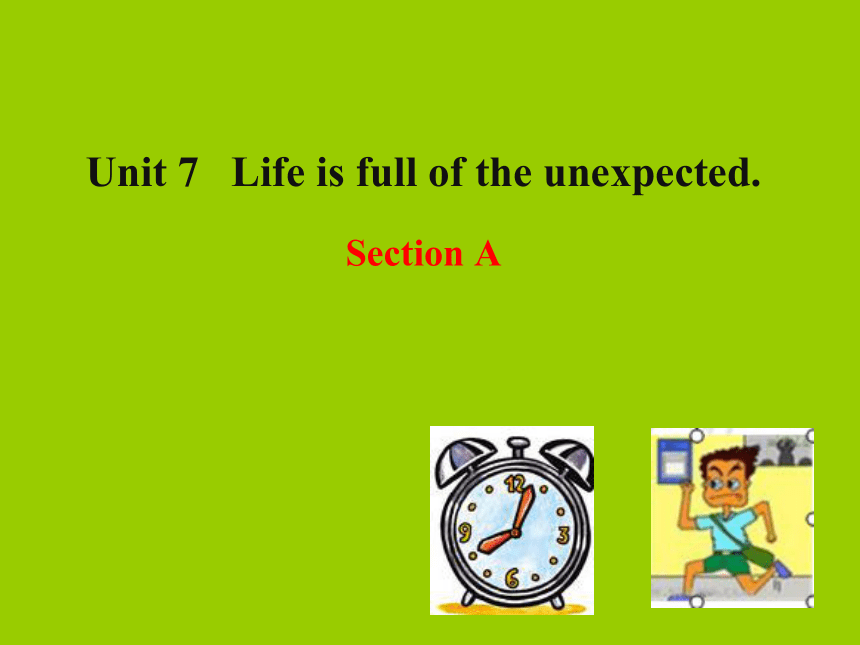 | |
| 格式 | ppt | ||
| 文件大小 | 2.1MB | ||
| 资源类型 | 教案 | ||
| 版本资源 | 鲁教版 | ||
| 科目 | 英语 | ||
| 更新时间 | 2017-08-13 11:34:40 | ||
图片预览

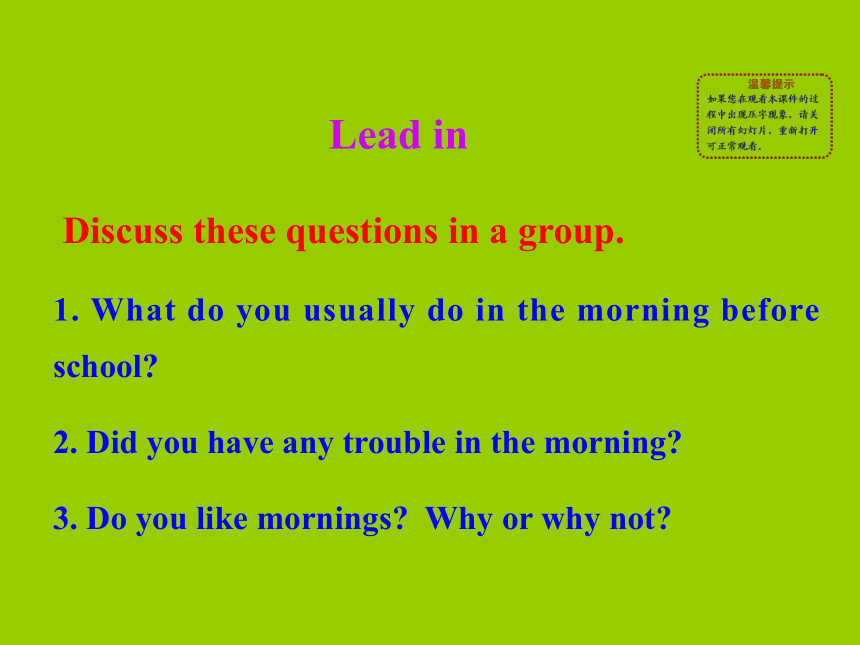
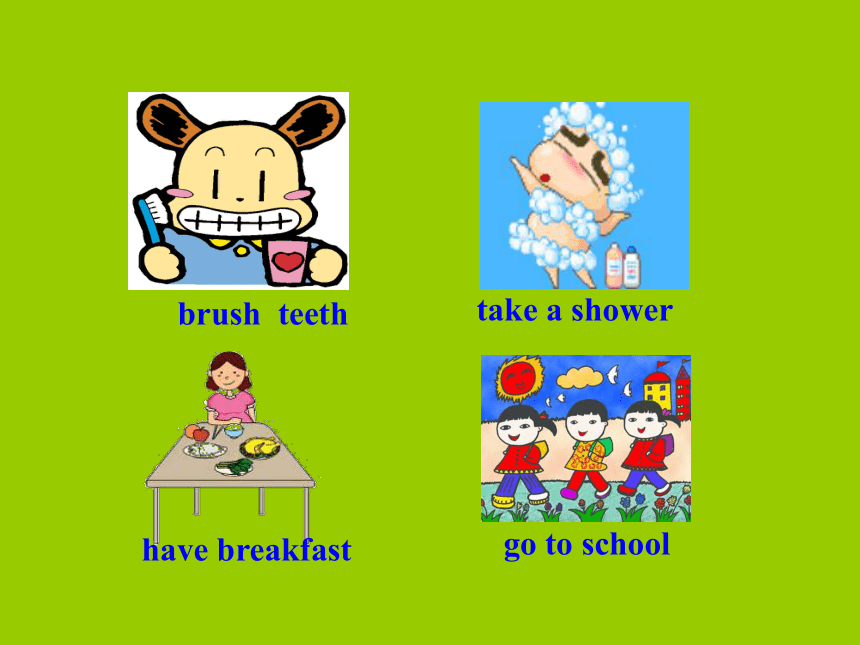
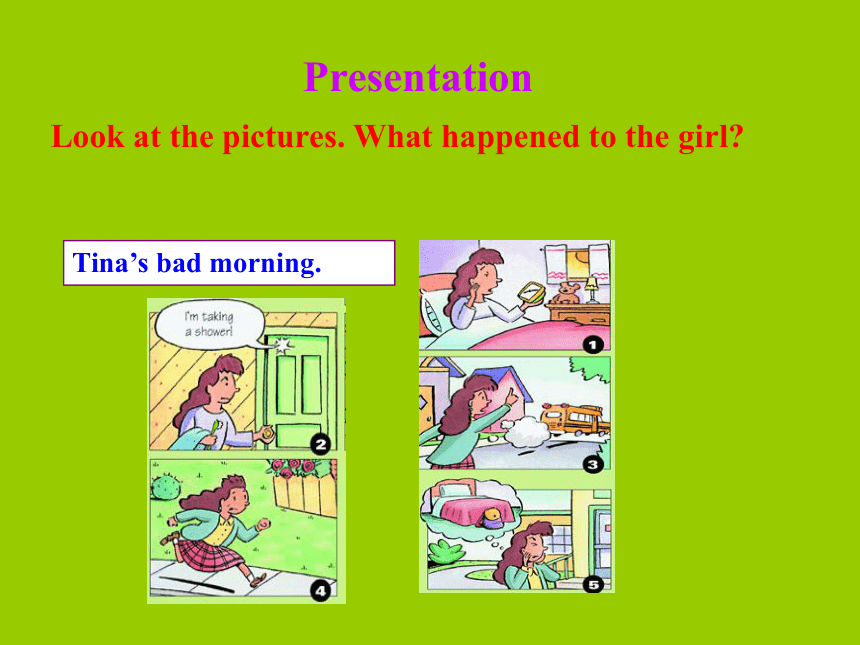
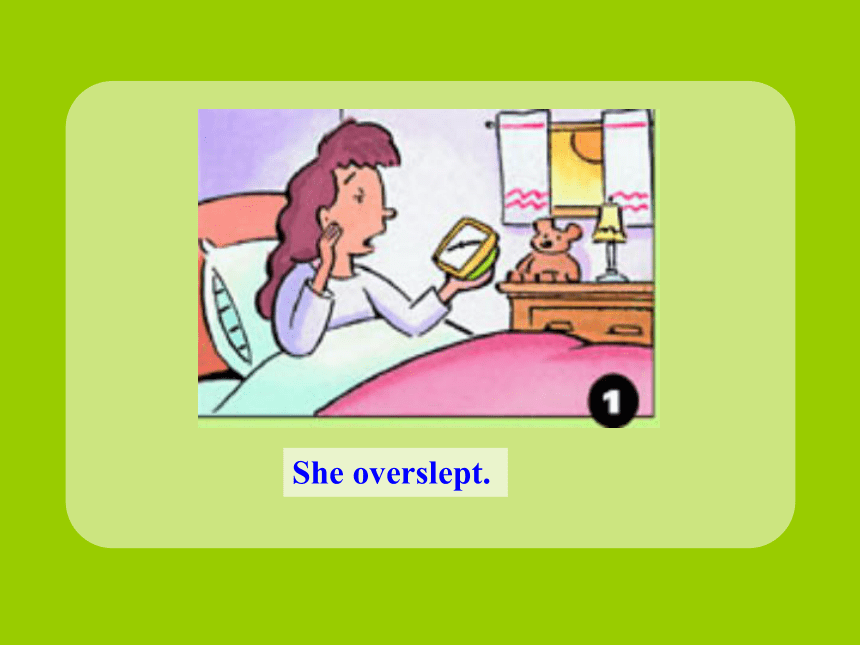
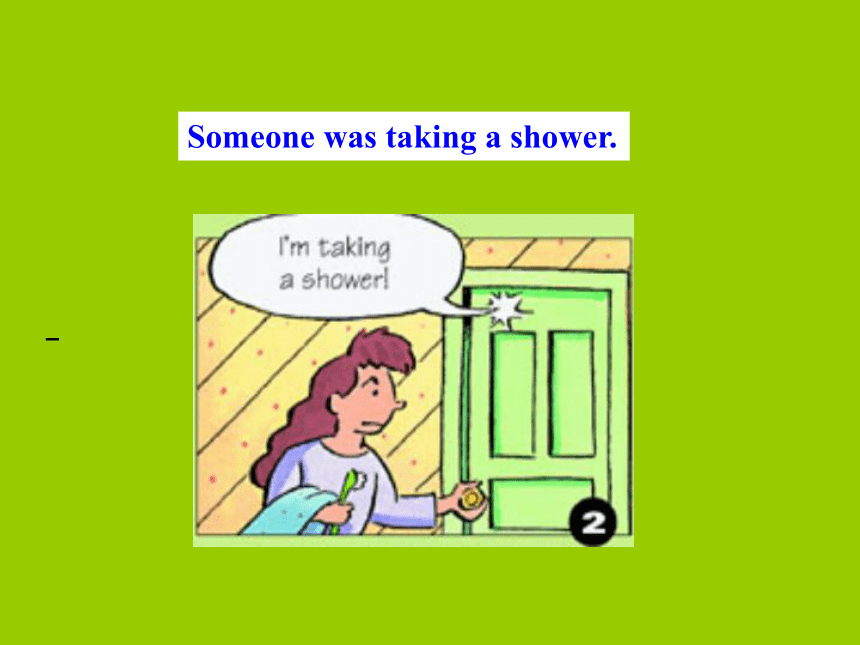
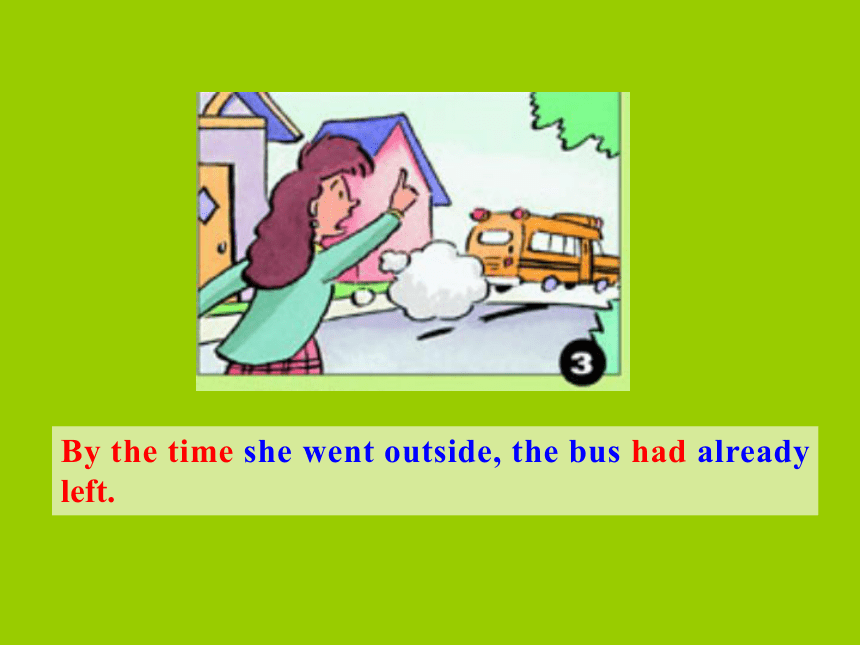

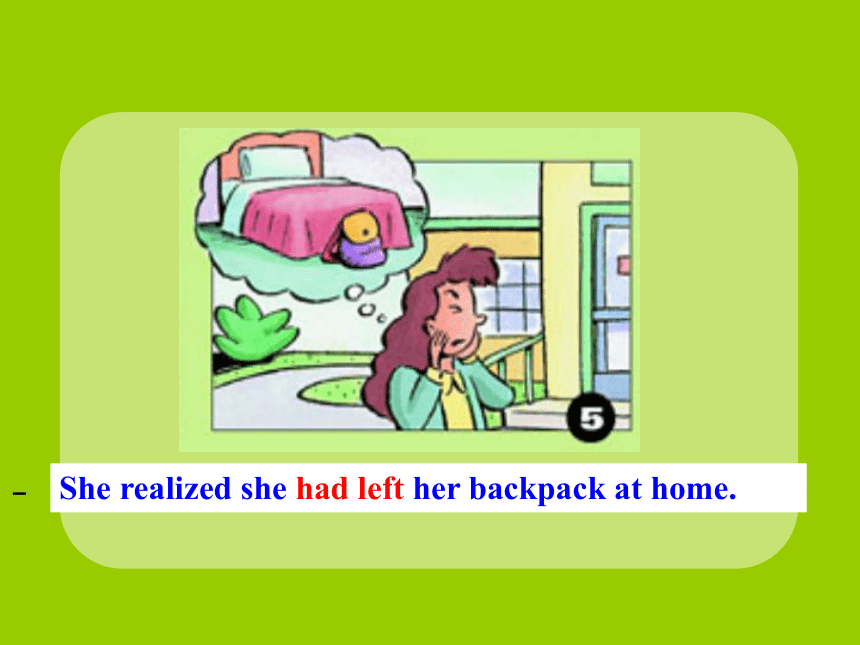
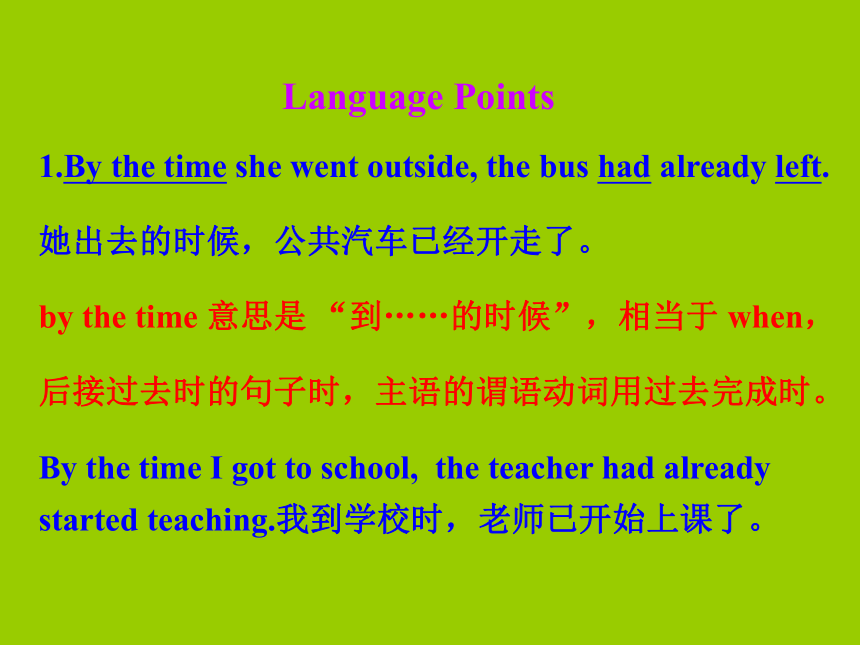
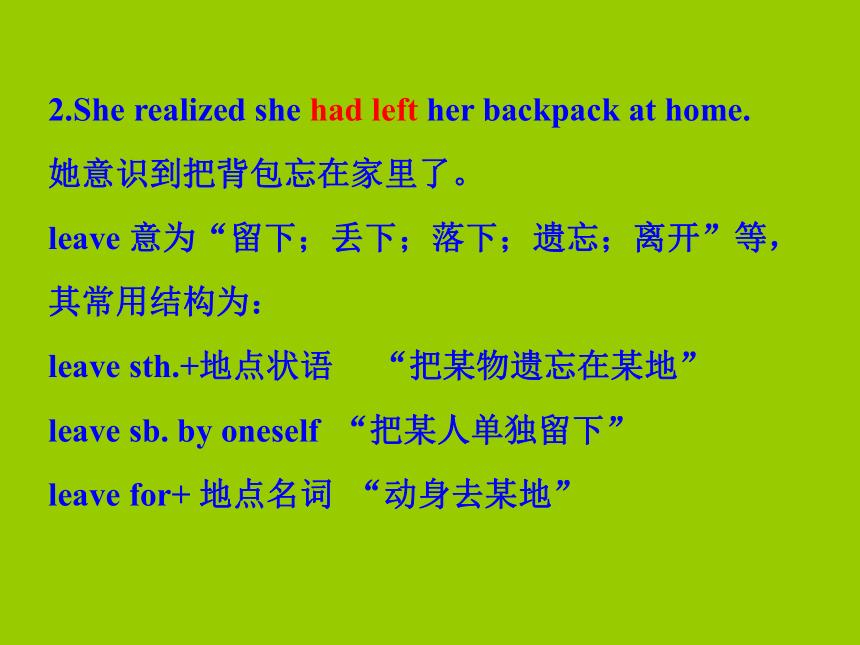

文档简介
(共47张PPT)
Unit 7 Life is full of the unexpected.
Section A
Discuss these questions in a group.
1. What do you usually do in the morning before school
2. Did you have any trouble in the morning
3. Do you like mornings Why or why not
Lead in
brush teeth
take a shower
have breakfast
go to school
Tina’s bad morning.
Presentation
Look at the pictures. What happened to the girl
She overslept.
Someone was taking a shower.
By the time she went outside, the bus had already left.
She had to run to school quickly.
She realized she had left her backpack at home.
1.By the time she went outside, the bus had already left.
她出去的时候,公共汽车已经开走了。
by the time 意思是 “到……的时候”,相当于 when,
后接过去时的句子时,主语的谓语动词用过去完成时。
By the time I got to school, the teacher had already started teaching.我到学校时,老师已开始上课了。
Language Points
2.She realized she had left her backpack at home.
她意识到把背包忘在家里了。
leave 意为“留下;丢下;落下;遗忘;离开”等,其常用结构为:
leave sth.+地点状语 “把某物遗忘在某地”
leave sb. by oneself “把某人单独留下”
leave for+ 地点名词 “动身去某地”
【辨析】leave与 forget
leave 意为“遗忘”时,与地点状语连用。
forget“遗忘”,后可接名词、代词、不定式或动名词作宾语。
1b Listen to Mary talking about her plete the sentences.
1.By the time I got up, my brother_____ already _______ in the shower.
2.By the time I got outside ,the bus____ already ____.
3.When I got to school, I realized I _____ ____ my backpack at home.
gotten
had
had
had
left
left
1c PAIRWORK Take turns being Mary. Look at the pictures above and talk about what happened this morning.
A: What happened
B: I overslept. By the time I got up, my brother had already gotten in the shower.
2a Listen to Mary continue her story.Number the pictures
[1-4 ] in the correct order.
1
2
3
4
2b Fill in the blanks with the correct forms of the verbs in brackets. Then listen again and check your answers.
1.When I______ (get) home, I realized I ________ (leave) my keys in the backpack.
2.By the time I _____ (get) back to school, the bell _________ (ring).
3.By the time I ________(walk) into class, the teacher ____________ (start) teaching already.
got
got
had rung
walked
had started
had left
2c PAIRWORK
Make up an ending for the story and share it with your partner.
The teacher looked at Mary and asked her to sit back her seat. After class, the teacher asked Tina to come to her office and asked why she was late. Tina told her the whole story this morning. The teacher asked her to get up earlier and not to be late for class again.
2d Role-play the conversation.
Matt: Why were you late for class today, Kevin
Kevin: My alarm clock didn’t go off ! I kept sleeping, and
when I woke up it was already 8:00 a.m.!
Matt: Oh, no!
Kevin: So I just quickly put on some clothes and rushed out the door.
Matt: You didn’t eat breakfast
Kevin: No, I didn’t even brush my teeth or wash my face! But before I got to the bus stop, the bus had already left .
Matt: Then how did you get here
Kevin: Luckily, Carl’s dad saw me on the street and gave me a lift in his car.
Matt: Well, at least by the time you got to school, you were only five minutes late for class.
Language points
1.My alarm clock didn’t go off!我的闹钟没有响!
go off意为“发出响声”。例如:My alarm clock didn’t go off this morning.我的闹钟今天早上没响。
◆即学即练
—Why were you late this morning
—My alarm clock didn’t _____, so I overslept.
A. go by B. go on C. go off D. go down
答案:C
2.I kept sleeping, and when I woke up it was already 8:00 a.m.! 我一直睡,当我醒来的时候已经八点了!
wake up意为“醒来”,wake sb. up意为“把某人叫醒”。
◆即学即练
Remember to wake me ____ at 6:30 tomorrow.
答案:up
3. So I just quickly put on some clothes and rushed out the door.所以我很快穿上衣服,冲出家门。
rush out意为“冲出去”。He caught up his hat and rushed out.他抓起他的帽子冲了出去。
◆即学即练
学生们冲出学校。
The children ____ ____ of school as soon as the bell rang.
答案:rushed out
4.Luckily, Carl’s dad saw me on the street and gave me a lift in his car.很幸运,卡尔爸爸看到我在街上,捎了我一程
give sb. a lift 是动词短语,意为“捎某人一程”,相当于give sb. a ride / give a ride to sb. 。
◆即学即练
你能捎我一段吗?______________________________
答案:Can you give me a lift
Preview
Ⅰ.短语互译
1. show up ___________ 2. be full of ___________
3. arrive at ____________ 4.be about to __________
5. even though ___________ 6.排队等候____________
7.起飞,脱掉___________ 8.心中想 _____________
9.变成 _________________ 10.弄清楚,搞明白________
答案:1. 赶到,露面 2. 充满 3. 到达 4. 刚要,即将 5. 虽然6.wait in line 7.take off 8.think to oneself 9. turn
into 10. find out
World Trade Center
in New York
On September 11,2001
hit the office buildings
building, burning
smoke, rising
It is announced that
three thousand people
died on that day.
On February 21,2001, in New Zealand
There was a big earthquake.
Many houses were destroyed .
Ⅱ.阅读3a文章判断下列句子的正(T)误(F)
1.In August 2001, I found a job in New York at the World Trade Center.
2.On September 11, 2001, I decided to get a coffee before I went to my office.
3.As I enjoyed my coffee I heard a loud sound.
4.I overslept on February 21, 2011 because my alarm clock didn’t go off.
5.I couldn’t get to New Zealand that day.
答案:1~5. FTFTT
Life Is Full of the Unexpected
In May 2001, I found a job in New York at the World Trade Center. On September 11, 2001, I arrived at my building at around 8:30 a.m. I was about to go up when I decided to get a coffee first. I went to my favorite coffee place even though it was two blocks east from my office. As I was waiting in line with other office workers, I heard a loud sound. Before I could join the others outside to see what was going on, the first plane had already hit my office building. We stared in disbelief at the black smoke rising above the burning building. I felt lucky to be alive.
Almost 10 years later, I woke up at 10:00 a.m. on February 21, 2011 and realized that my alarm never went off . I jumped out of bed and went straight to the airport. But by the time I got to the airport, my plane to New Zealand had already taken off. “This is the first holiday I’ve taken in a year, and now I've missed my plane. What bad luck!” I thought to myself. The other planes were full so I had to wait till the next day. The next morning, I heard about the earthquake in New Zealand the day before. My bad luck had unexpectedly turned into a good thing.
Incident
Date
Place
1 World Trade Center
was hit by planes. On September
11,2001 New York
2 There was an earthquake. On February
21,2011 New Zealand
How did the writer end up missing both events
He went to his coffee place. He wasn’t in the office when the plane hit the World Trade Center.
His alarm clock didn’t go off. He overslept and missed his flight. He didn’t go to New Zealand.
Language points
1.We stared in disbelief at the black smoke rising above the burning building.我们直愣愣地看着起火的大楼冒着黑烟,无法相信(这一切)。
(1) stare动词,意为“盯着看;凝视”,常与at搭配,构成stare at。
(2) disbelief意为“不信;怀疑”,dis-是表示相反或否定的前缀;in disbelief意为“怀疑地;不信地”。
(3) above作副词讲时,意为“在上面;向上面”,作介词时意为“在……上面”。
(4)burn的过去式和过去分词是burned, burned或burnt,burnt;作不及物动词,意为“着火;燃烧”,作及物动词意为“烧毁;烧伤”,常用搭配burn down意为“烧毁”。
◆即学即练
①It's rude to ______(盯着看) other people.
②He listened to this extraordinary story _________(怀疑).
③The plane is flying _____(在……上面) the clouds.
④Don’t forget to turn off the gas—you might ____(烧毁) the house.
答案:①stare at ②in disbelief ③above ④burn down
2. I felt lucky to be alive. 我庆幸我还活着。
alive形容词,意为“活着;有生气的”,只作表语。
◆即学即练
It was a bad accident—they’re lucky to be ____.
A.living B. live C. lively D. alive
答案:D
3.The other planes were full so I had to wait till the next day.其他飞机都客满所以我只能等到第二天。
till意为“到;直到”,与until同义。用于肯定句中时,与延续性动词连用,用在否定句中时,一般与非延续性动词连用,也可以与延续性动词连用。I waited till ten o’clock.我一直等到10点钟。
◆即学即练
I didn’t believe he could drive ____ he told me.
A. once B. while C. since D. till
答案:D
3a.Read the passage and answer the questions.
1.Which two events does the writer mention
(1)The World Trade Center was hit on September 11, 2001.
(2) An earthquake happened in New Zealand on February 21, 2011.
2. How did the writer end up missing both events
(1)He went to his favorite coffee place.
(2)His alarm clock didn't go off.
Grammar Focus
When I got to school, I realized that I had left my backpack at home.
By the time I got back to school, the bell had rung.
Before I got to the bus stop, the bus had already left.
I was about to go up to my office when I decided to get a coffee first.
As I was waiting in line with the other office workers, I heard a loud sound.
过去完成时
1. 过去完成时的含义:
主要是表示在过去某个时间,或是动作之前已经发生或完成的动作。也就是:过去的过去。
2.构成: had +v.-p.p
Grammar
3.过去完成时态的用法:
(1)表示过去的过去,通常由when或by引导的短语或者从句作时间状语或时间状语从句
① By the end of last year, I had learned about one thousand English words.
② By the time he was twenty, he had won about ten medals.
③ When I got there, they had already left.
(2) 常用在宾语从句中
① He told me he had already finished his homework.
② I realized he had fooled me again.
(3) 体现在上下文中
I didn’t go to the movies yesterday because I had seen it twice.
本课出现的主要动词的过去式和过去分词
ring rang rung
get got gotten
go went gone
leave left left
start started started
be was/were been
take took taken
run ran run
wake woke woken
I got home
now
9:00 pm
8:00 pm
My little brother went to bed.
By the time I got home, my little brother had gone to bed.
完成下列句子
by the time… 到……的时候
By the time I got home, ...
By the time I came in, ...
By the time I got to school, ...
By the time the bell rang, ...
By the time I got up, ...
Practice
Fill in the blanks with the correct forms of the words in the box.
had
showed up
rushed out
had forgotten
had
1. By the time I arrived at the party, everyone else ________
already_____________ .
2. When he put the noodles into a bowl, he realized he________________ to add the green beans.
3. By the time my mother came back from the market, I_______ already____________ the door to go for my piano lesson.
rush out,forget,arrive at,go into,show up,find out
4. Before she got to the airport, she________________ about the earthquake.
5. When she ____________ the movie theater, she remembered she had forgotten to feed her dog.
6. Before she got a chance to say goodbye, he________________
the building.
had found out
arrived at
had gone into
Choose one of the following situations and write a short passage about it.
being late for school/forgetting your homework/ leaving your books at home/locking your keys in your house
Homework
Better late than never.
迟做总比不做好。
Unit 7 Life is full of the unexpected.
Section A
Discuss these questions in a group.
1. What do you usually do in the morning before school
2. Did you have any trouble in the morning
3. Do you like mornings Why or why not
Lead in
brush teeth
take a shower
have breakfast
go to school
Tina’s bad morning.
Presentation
Look at the pictures. What happened to the girl
She overslept.
Someone was taking a shower.
By the time she went outside, the bus had already left.
She had to run to school quickly.
She realized she had left her backpack at home.
1.By the time she went outside, the bus had already left.
她出去的时候,公共汽车已经开走了。
by the time 意思是 “到……的时候”,相当于 when,
后接过去时的句子时,主语的谓语动词用过去完成时。
By the time I got to school, the teacher had already started teaching.我到学校时,老师已开始上课了。
Language Points
2.She realized she had left her backpack at home.
她意识到把背包忘在家里了。
leave 意为“留下;丢下;落下;遗忘;离开”等,其常用结构为:
leave sth.+地点状语 “把某物遗忘在某地”
leave sb. by oneself “把某人单独留下”
leave for+ 地点名词 “动身去某地”
【辨析】leave与 forget
leave 意为“遗忘”时,与地点状语连用。
forget“遗忘”,后可接名词、代词、不定式或动名词作宾语。
1b Listen to Mary talking about her plete the sentences.
1.By the time I got up, my brother_____ already _______ in the shower.
2.By the time I got outside ,the bus____ already ____.
3.When I got to school, I realized I _____ ____ my backpack at home.
gotten
had
had
had
left
left
1c PAIRWORK Take turns being Mary. Look at the pictures above and talk about what happened this morning.
A: What happened
B: I overslept. By the time I got up, my brother had already gotten in the shower.
2a Listen to Mary continue her story.Number the pictures
[1-4 ] in the correct order.
1
2
3
4
2b Fill in the blanks with the correct forms of the verbs in brackets. Then listen again and check your answers.
1.When I______ (get) home, I realized I ________ (leave) my keys in the backpack.
2.By the time I _____ (get) back to school, the bell _________ (ring).
3.By the time I ________(walk) into class, the teacher ____________ (start) teaching already.
got
got
had rung
walked
had started
had left
2c PAIRWORK
Make up an ending for the story and share it with your partner.
The teacher looked at Mary and asked her to sit back her seat. After class, the teacher asked Tina to come to her office and asked why she was late. Tina told her the whole story this morning. The teacher asked her to get up earlier and not to be late for class again.
2d Role-play the conversation.
Matt: Why were you late for class today, Kevin
Kevin: My alarm clock didn’t go off ! I kept sleeping, and
when I woke up it was already 8:00 a.m.!
Matt: Oh, no!
Kevin: So I just quickly put on some clothes and rushed out the door.
Matt: You didn’t eat breakfast
Kevin: No, I didn’t even brush my teeth or wash my face! But before I got to the bus stop, the bus had already left .
Matt: Then how did you get here
Kevin: Luckily, Carl’s dad saw me on the street and gave me a lift in his car.
Matt: Well, at least by the time you got to school, you were only five minutes late for class.
Language points
1.My alarm clock didn’t go off!我的闹钟没有响!
go off意为“发出响声”。例如:My alarm clock didn’t go off this morning.我的闹钟今天早上没响。
◆即学即练
—Why were you late this morning
—My alarm clock didn’t _____, so I overslept.
A. go by B. go on C. go off D. go down
答案:C
2.I kept sleeping, and when I woke up it was already 8:00 a.m.! 我一直睡,当我醒来的时候已经八点了!
wake up意为“醒来”,wake sb. up意为“把某人叫醒”。
◆即学即练
Remember to wake me ____ at 6:30 tomorrow.
答案:up
3. So I just quickly put on some clothes and rushed out the door.所以我很快穿上衣服,冲出家门。
rush out意为“冲出去”。He caught up his hat and rushed out.他抓起他的帽子冲了出去。
◆即学即练
学生们冲出学校。
The children ____ ____ of school as soon as the bell rang.
答案:rushed out
4.Luckily, Carl’s dad saw me on the street and gave me a lift in his car.很幸运,卡尔爸爸看到我在街上,捎了我一程
give sb. a lift 是动词短语,意为“捎某人一程”,相当于give sb. a ride / give a ride to sb. 。
◆即学即练
你能捎我一段吗?______________________________
答案:Can you give me a lift
Preview
Ⅰ.短语互译
1. show up ___________ 2. be full of ___________
3. arrive at ____________ 4.be about to __________
5. even though ___________ 6.排队等候____________
7.起飞,脱掉___________ 8.心中想 _____________
9.变成 _________________ 10.弄清楚,搞明白________
答案:1. 赶到,露面 2. 充满 3. 到达 4. 刚要,即将 5. 虽然6.wait in line 7.take off 8.think to oneself 9. turn
into 10. find out
World Trade Center
in New York
On September 11,2001
hit the office buildings
building, burning
smoke, rising
It is announced that
three thousand people
died on that day.
On February 21,2001, in New Zealand
There was a big earthquake.
Many houses were destroyed .
Ⅱ.阅读3a文章判断下列句子的正(T)误(F)
1.In August 2001, I found a job in New York at the World Trade Center.
2.On September 11, 2001, I decided to get a coffee before I went to my office.
3.As I enjoyed my coffee I heard a loud sound.
4.I overslept on February 21, 2011 because my alarm clock didn’t go off.
5.I couldn’t get to New Zealand that day.
答案:1~5. FTFTT
Life Is Full of the Unexpected
In May 2001, I found a job in New York at the World Trade Center. On September 11, 2001, I arrived at my building at around 8:30 a.m. I was about to go up when I decided to get a coffee first. I went to my favorite coffee place even though it was two blocks east from my office. As I was waiting in line with other office workers, I heard a loud sound. Before I could join the others outside to see what was going on, the first plane had already hit my office building. We stared in disbelief at the black smoke rising above the burning building. I felt lucky to be alive.
Almost 10 years later, I woke up at 10:00 a.m. on February 21, 2011 and realized that my alarm never went off . I jumped out of bed and went straight to the airport. But by the time I got to the airport, my plane to New Zealand had already taken off. “This is the first holiday I’ve taken in a year, and now I've missed my plane. What bad luck!” I thought to myself. The other planes were full so I had to wait till the next day. The next morning, I heard about the earthquake in New Zealand the day before. My bad luck had unexpectedly turned into a good thing.
Incident
Date
Place
1 World Trade Center
was hit by planes. On September
11,2001 New York
2 There was an earthquake. On February
21,2011 New Zealand
How did the writer end up missing both events
He went to his coffee place. He wasn’t in the office when the plane hit the World Trade Center.
His alarm clock didn’t go off. He overslept and missed his flight. He didn’t go to New Zealand.
Language points
1.We stared in disbelief at the black smoke rising above the burning building.我们直愣愣地看着起火的大楼冒着黑烟,无法相信(这一切)。
(1) stare动词,意为“盯着看;凝视”,常与at搭配,构成stare at。
(2) disbelief意为“不信;怀疑”,dis-是表示相反或否定的前缀;in disbelief意为“怀疑地;不信地”。
(3) above作副词讲时,意为“在上面;向上面”,作介词时意为“在……上面”。
(4)burn的过去式和过去分词是burned, burned或burnt,burnt;作不及物动词,意为“着火;燃烧”,作及物动词意为“烧毁;烧伤”,常用搭配burn down意为“烧毁”。
◆即学即练
①It's rude to ______(盯着看) other people.
②He listened to this extraordinary story _________(怀疑).
③The plane is flying _____(在……上面) the clouds.
④Don’t forget to turn off the gas—you might ____(烧毁) the house.
答案:①stare at ②in disbelief ③above ④burn down
2. I felt lucky to be alive. 我庆幸我还活着。
alive形容词,意为“活着;有生气的”,只作表语。
◆即学即练
It was a bad accident—they’re lucky to be ____.
A.living B. live C. lively D. alive
答案:D
3.The other planes were full so I had to wait till the next day.其他飞机都客满所以我只能等到第二天。
till意为“到;直到”,与until同义。用于肯定句中时,与延续性动词连用,用在否定句中时,一般与非延续性动词连用,也可以与延续性动词连用。I waited till ten o’clock.我一直等到10点钟。
◆即学即练
I didn’t believe he could drive ____ he told me.
A. once B. while C. since D. till
答案:D
3a.Read the passage and answer the questions.
1.Which two events does the writer mention
(1)The World Trade Center was hit on September 11, 2001.
(2) An earthquake happened in New Zealand on February 21, 2011.
2. How did the writer end up missing both events
(1)He went to his favorite coffee place.
(2)His alarm clock didn't go off.
Grammar Focus
When I got to school, I realized that I had left my backpack at home.
By the time I got back to school, the bell had rung.
Before I got to the bus stop, the bus had already left.
I was about to go up to my office when I decided to get a coffee first.
As I was waiting in line with the other office workers, I heard a loud sound.
过去完成时
1. 过去完成时的含义:
主要是表示在过去某个时间,或是动作之前已经发生或完成的动作。也就是:过去的过去。
2.构成: had +v.-p.p
Grammar
3.过去完成时态的用法:
(1)表示过去的过去,通常由when或by引导的短语或者从句作时间状语或时间状语从句
① By the end of last year, I had learned about one thousand English words.
② By the time he was twenty, he had won about ten medals.
③ When I got there, they had already left.
(2) 常用在宾语从句中
① He told me he had already finished his homework.
② I realized he had fooled me again.
(3) 体现在上下文中
I didn’t go to the movies yesterday because I had seen it twice.
本课出现的主要动词的过去式和过去分词
ring rang rung
get got gotten
go went gone
leave left left
start started started
be was/were been
take took taken
run ran run
wake woke woken
I got home
now
9:00 pm
8:00 pm
My little brother went to bed.
By the time I got home, my little brother had gone to bed.
完成下列句子
by the time… 到……的时候
By the time I got home, ...
By the time I came in, ...
By the time I got to school, ...
By the time the bell rang, ...
By the time I got up, ...
Practice
Fill in the blanks with the correct forms of the words in the box.
had
showed up
rushed out
had forgotten
had
1. By the time I arrived at the party, everyone else ________
already_____________ .
2. When he put the noodles into a bowl, he realized he________________ to add the green beans.
3. By the time my mother came back from the market, I_______ already____________ the door to go for my piano lesson.
rush out,forget,arrive at,go into,show up,find out
4. Before she got to the airport, she________________ about the earthquake.
5. When she ____________ the movie theater, she remembered she had forgotten to feed her dog.
6. Before she got a chance to say goodbye, he________________
the building.
had found out
arrived at
had gone into
Choose one of the following situations and write a short passage about it.
being late for school/forgetting your homework/ leaving your books at home/locking your keys in your house
Homework
Better late than never.
迟做总比不做好。
同课章节目录
- Unit 1 When was it invented?
- Section A
- Section B
- Unit 2 Teenagers should be allowed to choose their
- Section A
- Section B
- Unit 3 It must belong to Carla.
- Section A
- Section B
- Unit 4 I like music that I can dance to.
- Section A
- Section B
- Unit 5 You’re supposed to shake hands.
- Section A
- Section B
- Unit 6 Sad movies make me cry.
- Section A
- Section B
- Unit 7 Life is full of the unexpected.
- Section A
- Section B
- Unit 8 We're trying to save the earth!
- Section A
- Section B
- Unit 9 It's important to have good habits.
- Section A
- Section B
- Unit 10 I remember meeting all of you in Grade 6.
- Section A
- Section B
